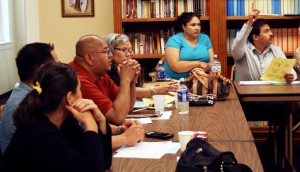Hispanics in parishes look to serve the church as deacons
By Barb Arland-Fye
The Catholic Messenger
DAVENPORT — José Chávez of St. Mary Parish, Oskaloosa, and Vincente Díaz of St. James Parish, Washington, strive to serve God, teach others about the Catholic faith and set an example in their parishes. They were among 25 Hispanic Catholics who participated in an introduction to deacon formation at Diocese of Davenport headquarters July 26.

Participants in an introduction to deacon formation for Hispanics listen and ask questions July 26 at the St. Vincent Center in Davenport. The meeting was intended to share information about deacon formation in the Diocese of Davenport.
Participants at the meeting had been referred to the diocese by their pastors and IlaMae Hanisch, former Adult & Family Formation/Lay Ministry coordinator. Miguel Moreno, diocesan coordinator of Multicultural Ministries, facilitated the introductory meeting. Deacon Frank Agnoli, diocesan director of deacon formation, provided a short overview.
“We wanted to see what interest there might be among members of the Hispanic community regarding formation for the diaconate and to provide a brief introduction as to what the program would include,” Deacon Agnoli said. The permanent diaconate allows married men to be ordained deacons serving the Roman Catholic Church.
Moreno said he explained to participants the dimensions of deacon formation: human, spiritual, theological and pastoral. He told them the Multicultural Ministry office would help them to get files on their education records and sacramental certificates and with becoming proficient in English.
Interviews for admission to Deacon Class VIII are planned for 2016-17 with formation beginning in fall 2017. That schedule could change because Bishop Martin Amos will be required to submit his resignation in December 2016, when he turns 75.
Potential deacon candidates “would be part of our diocesan deacon formation program. The point is calling forth and preparing deacons from the Hispanic community,” Deacon Agnoli said. “But it shouldn’t be envisioned as something separate. Every community should give birth to vocations — to lay ministry, to the diaconate, religious life, and priesthood, as well as to marriage. We are one Church, one diocese.”
Added Moreno: “A deacon, as is a priest, is prepared to carry evangelization out to all the communities. So they have to be prepared to do their ministry in the Church, not just with one community.”
While the diocese doesn’t envision a separate program, language-based adjustments would be available. “What we decided was that primary formation will still have to be in English, that’s the language we use for theological formation at St. Ambrose University (Davenport),” Deacon Agnoli said. That means Hispanic deacon candidates need to be bilingual. However, an alternative/parallel reading list of Spanish texts and completion of written assignments in Spanish (translated to English) are possibilities. Required psychological interviews could also be conducted in Spanish to ensure candidates feel that they have clearly communicated their thoughts. Other issues to consider: immigration status, completion of the Ministry Formation Program (MFP) and whether one-weekend-per-month classes in Davenport (six years altogether) are doable for candidates who may have to work weekends.
“It’s one formation program, one diaconate. But we take the applicants where they are and help them to address whatever they need to address to succeed in the program — the same as we do now,” Deacon Agnoli said. “What’s different is language issues.”
Concerns participants expressed at the introductory meeting included transportation, work schedule and English proficiency, Moreno said. They are now going to talk among themselves, as couples, as families, before making a decision about applying for admission to the deacon formation program, he added.
Vincente Díaz says he is thinking about pursuing a call to the diaconate, but it’s scary. “Accepting Jesus is forever. I know if I say I’m going to do it, I’m going to do it … I’m willing to serve God by teaching others, helping out, being an example.” His wife, Genoveva, who accompanied him to the meeting, said she is very happy about the possibility of her husband becoming a deacon.
José Chávez says he feels blessed by God and wants to give back, by being of service, “to help out our priests so that they won’t feel they are alone.”
Moreno said he’ll help potential candidates with their files, to be organized, so that when the time comes they will apply. “Also, I will help them to find English classes close to home. If they are accepted, I will help them to be successful in class.”
Deacon Agnoli says Moreno “will be instrumental in reaching out to the community and serving as a bridge to diocesan offices and to those who minister in the Hispanic community. He provides invaluable help in translation issues, and has had experience in formation. He brings his own theological and pastoral expertise as well.”
Both diocesan leaders see great opportunities for enrichment in a diaconate formation program in which Hispanic and Anglo deacon candidates participate. Sharing of cultural experiences and praying in English and in Spanish during deacon formation weekends would help foster a sense of community among all candidates and their spouses. “Even now, we have a requirement that deacon candidates learn basic, pastoral Spanish,” Deacon Agnoli said.
Deacon formation classes typically have about 20 couples, but could accommodate 25 couples maximum, Deacon Agnoli noted. “If we have too many, that’s a happy problem to have.”








